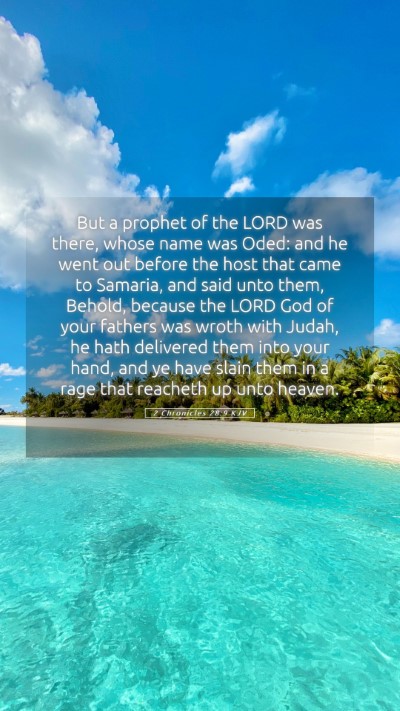Understanding 2 Chronicles 28:9 - A Comprehensive Bible Verse Commentary
2 Chronicles 28:9 states:
"But a prophet of the Lord was there, whose name was Oded: and he went out before the host that came to Samaria, and said unto them, Behold, because the Lord God of your fathers was wroth with Judah, he hath delivered them into your hand, and ye have slain them in a rage that reacheth up unto heaven." (2 Chronicles 28:9 KJV)
Summary of 2 Chronicles 28:9
This verse records a significant moment during the reign of King Ahaz of Judah, where the Lord's intention for Judah is revealed through the prophet Oded. The context of this verse discusses the aftermath of Judah's defeat and the resulting actions of their captors.
Key Themes and Insights
- The Role of Prophets: The appearance of the prophet Oded underscores the importance of prophetic voices in communicating God's will during times of trouble, as noted by Matthew Henry.
- Divine Judgment: The verse hints at God's judgment upon Judah, which serves as a reminder of the consequences of sin and rebellion against God’s commandments. Albert Barnes elaborates that this judgement was part of the covenant relationship between God and Israel.
- God’s Sovereignty: The phrase "the Lord God of your fathers was wroth with Judah" reflects the understanding that God is sovereign over nations and their leaders, as highlighted by Adam Clarke.
- Motives of the Captors: The warning to Assyrians points to the danger of their unrestrained rage against God's chosen people, drawing attention to moral and ethical treatment in warfare and punishment.
In-Depth Analysis
To gain a deeper understanding of 2 Chronicles 28:9, it is essential to consider the historical and theological implications of the events described. The following points are worth noting:
Historical Context
- During this time, Judah was under threat from various surrounding nations, including Israel and Syria. King Ahaz's policies led to significant turmoil.
- The Assyrians, under whom recovering captives faced potential punishment, are integral to the narrative, reflecting the historical conflict between these civilizations.
- Understanding the background of King Ahaz's rule provides valuable insight into the spiritual decline of Judah.
Theological Significance
- This verse re-emphasizes the prophetic responsibility, showing how God intervenes through prophets even amidst human conflict, a theme that resonates across multiple Old Testament narratives.
- The relationship between divine will and human action is illuminated, especially regarding the destructive motives of Judah’s enemies.
- In the broader context, it signifies God's ongoing involvement with His people, shining a light on the dynamics of faithfulness and infidelity.
Application of 2 Chronicles 28:9
The essence of 2 Chronicles 28:9 provides various applications for contemporary believers:
- Recognizing the need for prophetic voices today—ministers and laypeople who speak truth into conflict and chaos.
- Understanding the consequences of our nation's moral choices and seeking to align them with God's will.
- Developing compassion and ethical standards when dealing with others, particularly in situations rife with anger and vengeance.
Cross References
This verse can be related to several other biblical passages that offer additional insights:
- Isaiah 8:7-8 - The prophecy of judgment against Israel.
- 2 Kings 16:9 - The account of Ahaz's actions in alliance with Assyria.
- Ezekiel 25:12 - A prophecy concerning Edom that reflects similar themes of divine judgment.
Conclusion
2 Chronicles 28:9 encapsulates pivotal themes of divine judgment, the prophetic role, and the moral implications of human actions in the face of God's sovereignty. The insights drawn from historical context, theological analysis, and practical applications provide a multi-faceted understanding of this important scripture.
For those involved in Bible study groups, this verse serves as a profound lesson on understanding God's will through difficult situations and learning how to apply biblical truths to our lives today.


